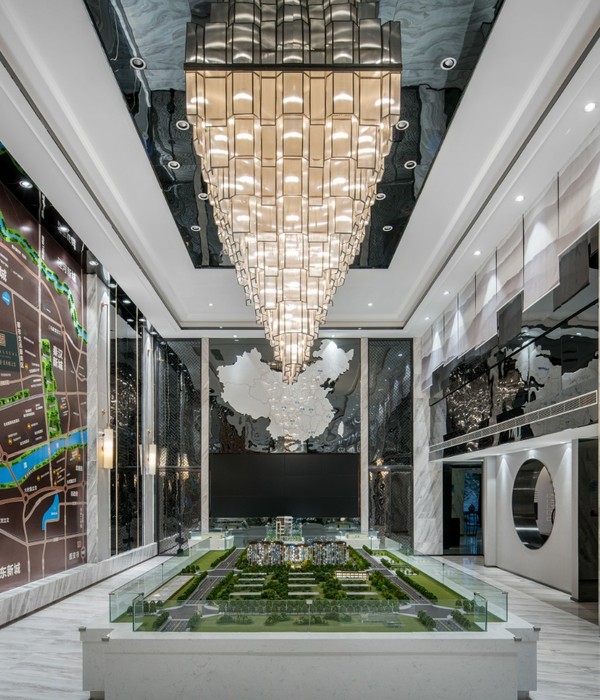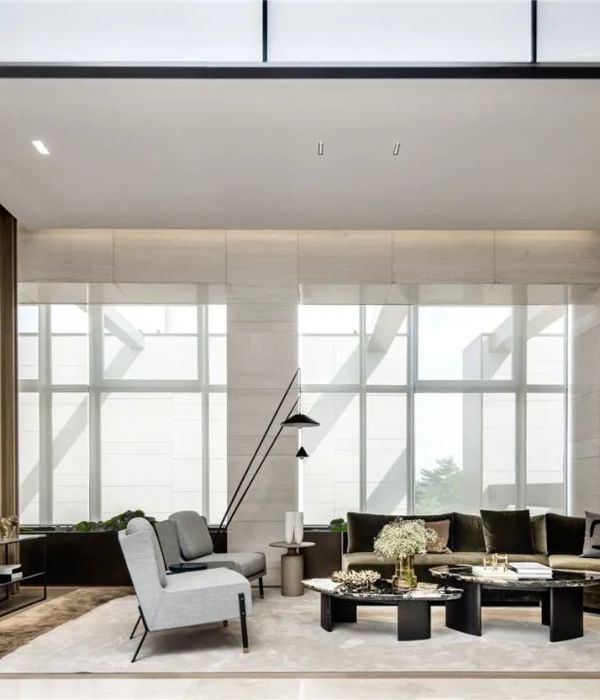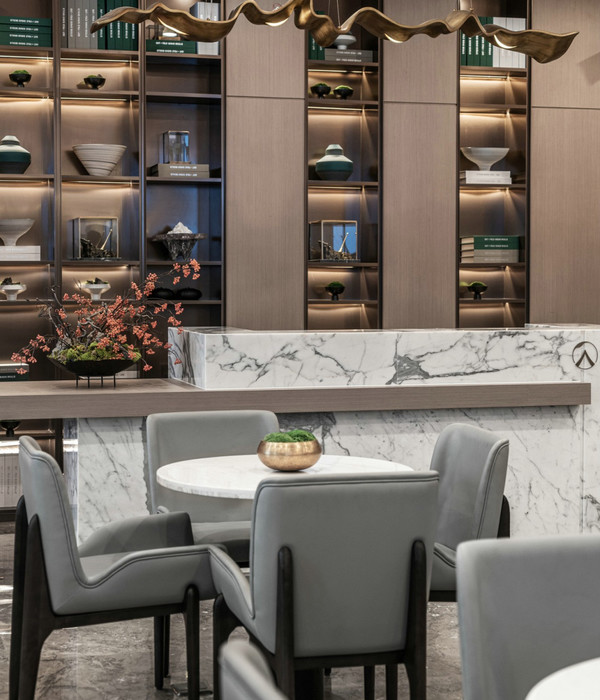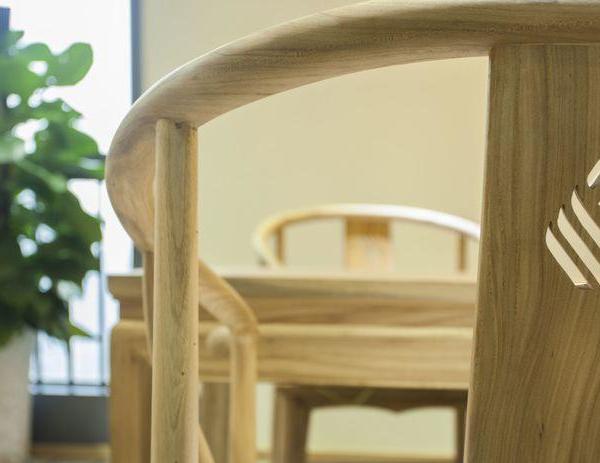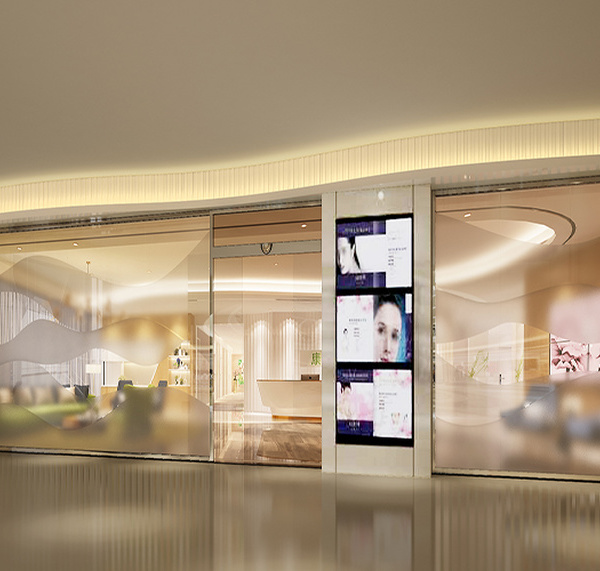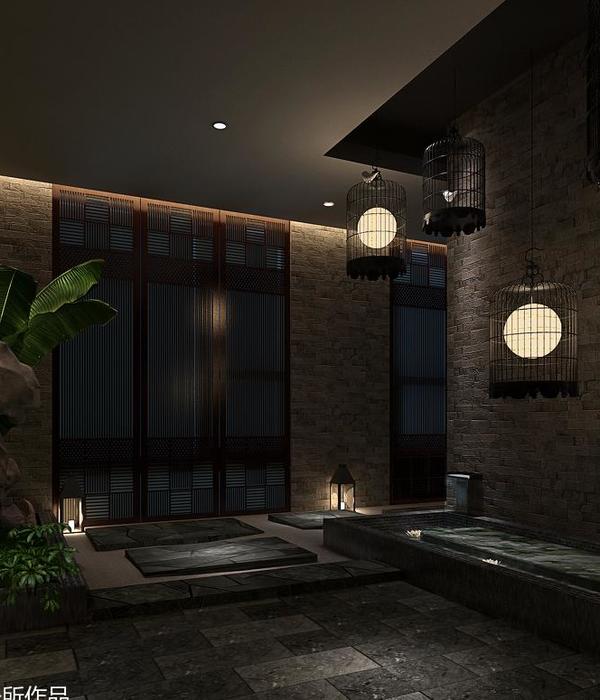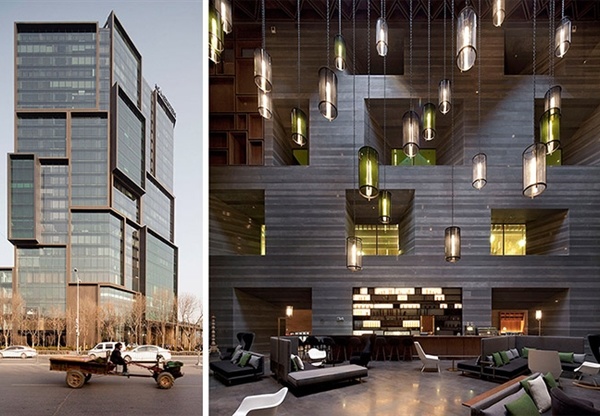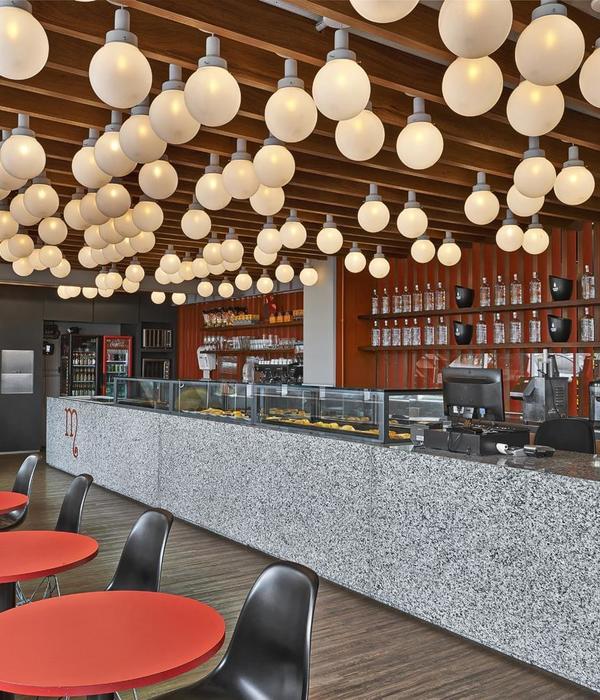OPEN Prototype for Temporary Sales Pavilion / OPEN Architecture
设计方:OPEN Architecture
位置: 北京
分类:商业建筑
内容:实景照片
项目规模:1115平方米
图片:28张
售楼处是中国新建筑的一个独特的建筑类型,也代表了一种独特的中国现象。每个住宅开发项目建设之前,总会有一售楼处率先出现。这些标志性的“小品”建筑大多数与其所服务销售的住宅项目没有直接关系,但通常都会在设计上标新立异、奢华夸张。在相当长的时间里,售楼处是一种难得的给予建筑师创作自由的建筑类型,不仅成就了先锋建筑师们的设计实验,还给长期被制约的建筑师们提供了暂时释放压力的机会。然而这种昂贵的临时建筑通常是很短寿的,在其销售功能结束后大多被拆除,幸存者被改造为其他用途。
OPEN开始思考售楼处现象背后的问题,尤其是大量浪费的资源和设计的努力。这成为OPEN设计西华府售楼处的出发点,即为它的开发商——万科集团设计出一个标准临时售楼处原型的1.0版本。经过与中国建筑科学研究院工程师们的密切合作,一个可以快速建造、适用于不同功能和场地,并且可拆卸和异地拼装的售楼处原型终于完成。这是从根本上挖掘建筑可持续性潜力的一次实验,不仅在于它所实现的物质形式,更在于其生命周期的意义。
这个原型的设计受到中国古代可拆卸、可重组的木构建筑的启发。同一个模数化的体系下的预制钢结构骨架和钢板混凝土复合楼板单元,全部在现场以螺栓连接,快速建造;模数化的理念同样运用于建筑外围护结构,铝板幕墙和玻璃幕墙在统一的模数控制下,在很大程度上满足了在不同需求下外立面模块的自由重组。
内部空间里插入了五个具有不同功能的“盒子”,盒子间由一个纵向贯通开放空间的位于二层的“桥”联系起来,余下的则是一个宽敞连续的开放空间,作为公共活动与展示之用。不管是五个盒子的位置还是室内材料、装饰都可以富于变化。在这个建成版本中,极简的设计营造出明快的色彩与具有未来感的氛围,与渐已习惯于奢华却折衷主义风格售楼处的参观者的期待大相径庭。
最后呈现出来的原型1.0版是漂浮于水面之上的一个水平伸展银灰色筒体,像是60年代的空间实验舱。进入建筑要经过一个跨越水池的步行桥,人们经由筒体的一端进入售楼处,依次经过不同功能的内部空间之后,再由另一端走出,前往参观后面的样板房。
建筑面积:1115平方米
建筑时间:2013
图片来源:Su Shengliang
译者: 艾比
As a unique Chinese architectural typology in recent years, sales pavilion reflects rather interesting phenomena. A sales pavilion will surely be built before the sales of almost every housing project in China. Extravaganzas as these pavilion buildings often are, in terms of form and décor, they normally bare almost no relationship to the actual housing marketed and sold inside.
This building typology has been a beloved experimental field for elite architects practicing in China, offering much design and budget freedom that most other types of buildings do not enjoy. However, temporary buildings as they were born to be, these costly pavilions are often demolished shortly after the sales were completed, and in some lucky cases, converted to other functions.
OPEN started to reflect on these unique phenomena especially the wasted resources and design efforts. This became the starting point for Xihuafu Sales Pavilion which serves as prototype V1.0 of standard temporary sales pavilion for the development company VANKE Group.
Working together with engineers from China Academy of Building Research, OPEN conceived a prototype building system that enables speedy construction, can be adaptable to different programs and sites, and more importantly, dissembled after each use and reassembled at another location. This re-useable building is an experiment to test the ultimate potential of sustainability, not only in its realized physical form, but also the meaning in its life cycle.
This prototype was inspired by ancient Chinese wooden structures that can be taken apart and put together again, sometimes at a different locale. Devised from one modular system, the steel structural skeleton, and the composite floor panels made from steel and concrete, are prefabricated and bolted together on site.
The modular concepts extends to the building envelope – both the solid aluminum panels and the glass panels take on the same module, which allows a somewhat free arrangement of openings on the façade according to different program requirement behind.
Internally, the space is organized with one bridge that connects 5 boxes that each contains different types of functions, yet allowing a large continuous open space to organize the public viewing and events. The interior décor can vary, as well as the positions of the five boxes. In this built case, a minimal yet colorful and futuristic atmosphere is created to counter the common expectation for the luxurious yet often compromised spaces that the public is used to see around them.
The pavilion presents itself from the outside as a simple horizontal silver tube floating above a sheet of water, recalling 1960s’ experimental space capsules. The visitors approach the building through a rising bridge over the reflecting pond, entering the pavilion from one end of the large tube, through the different functional spaces inside, exit on the other end of the tube, before they walk towards the show-flat behind.
This temporary sales pavilion offers an opportunity for OPEN to realize for the first time, their concept and experimentation on mass-customization started almost 10 years ago in New York City in the forming years of OPEN Architecture Studio, such as the eco-tube and XYZ housing works.
北京临时售楼处原型外观局部图
北京临时售楼处原型内部局部图
北京临时售楼处原型内部细节图
北京临时售楼处原型
{{item.text_origin}}

